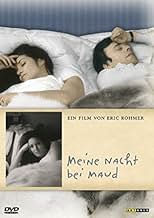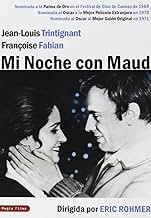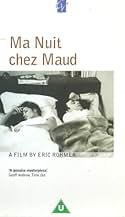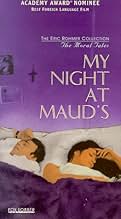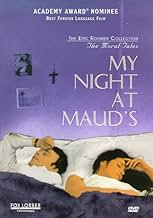I rigidi principi di un devoto cattolico vengono sfidati durante un soggiorno di una notte con Maud, una donna divorziata con una personalità fuori misura.I rigidi principi di un devoto cattolico vengono sfidati durante un soggiorno di una notte con Maud, una donna divorziata con una personalità fuori misura.I rigidi principi di un devoto cattolico vengono sfidati durante un soggiorno di una notte con Maud, una donna divorziata con una personalità fuori misura.
- Candidato a 2 Oscar
- 6 vittorie e 6 candidature totali
- Marie
- (non citato nei titoli originali)
- Student
- (non citato nei titoli originali)
Trama
Lo sapevi?
- QuizJean-Louis Trintignant's character is never called by name in the entire film. He is shown in credits as "Jean-Louis."
- BlooperWhen Jean-Louis Trintignant accepts to climb into bed with Françoise Fabian, he motions for her to pass him the blanket, extending his right hand holding a lit cigarette. The next shot from the side shows him grasping the blanket with a cigarette-free right hand.
- Citazioni
Jean-Louis: Are you still a Marxist?
Vidal: Absolutely. For a Communist, Pascal's wager is very relevant today. Personally, I very much doubt that history has any meaning. Yet I wager that it has, so I'm in a Pascalian situation. Hypothesis A: Society and politics are meaningless. Hypothesis B: History has meaning. I'm not at all sure B is more likely to be true than A. More likely the reverse. Let's even suppose B has a 10% chance of being true and A has 80%. Nevertheless I have no choice but to opt for B, because only the hypothesis that history has meaning allows me to go on living. Suppose I bet on A, and B was true, despite the lesser odds. I'd have thrown away my life. So I must choose B to justify my life and actions. There's an 80% chance I'm wrong but that doesn't matter.
Jean-Louis: Mathematical hope. Potential gain divided by probability. With your hypothesis B, though the probability is slight, the possible gain is infinite. In your case, a meaning to life. In Pascal's, eternal salvation.
Vidal: It was Gorky, Lenin or maybe Mayakovsky who said about the Russian revolution that the situation forced them to choose the one chance in a thousand. Because hope became infinitely greater if you took that chance than if you didn't take it.
- ConnessioniFeatured in The 82nd Annual Academy Awards (2010)
Because it is a dialogue-driven piece, much more happens in the 54-minute-long "Suzanne's Career", Rohmer's second moral tale, than in "My Night at Maud's", which is about an hour longer. It can seem meandering at times, especially the first-half of the film, but put your trust in Rohmer. We're being bored to death for a reason. Listening to two Frenchmen discuss Pascal's Wager isn't very entertaining, but the payoff comes when, later on in the film, the characters are put into situations in which they have to make their own Pascal's wager, metaphorically speaking. The reward comes when we see these philosophies which they discussed tested in real-life situations, and we see how true, or untrue, to their ideals these characters are.
During the first fifty minutes, you may be bored out of your skull, but the way the film unfolds, you'll probably want to go back and watch the first fifty minutes again after it's over.
- reasonformirrors
- 9 giu 2008
- Permalink
I più visti
Dettagli
Botteghino
- Lordo in tutto il mondo
- 11.088 USD
- Tempo di esecuzione1 ora 50 minuti
- Colore
- Mix di suoni
- Proporzioni
- 1.33 : 1
Contribuisci a questa pagina



